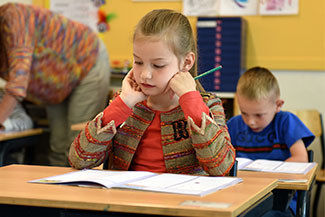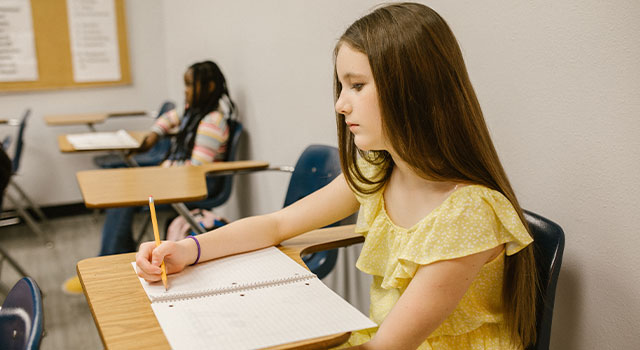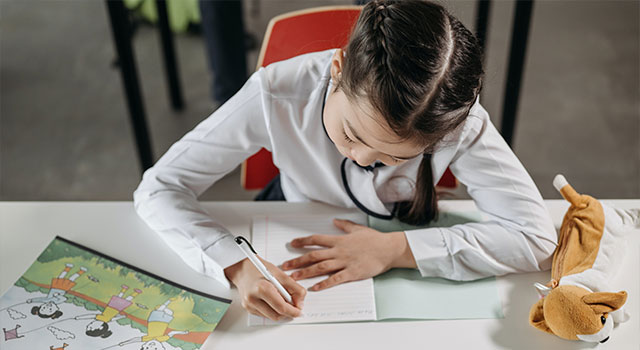
Vision Therapy Helps Children with Poor Reading Skills
Research shows that 75% to 90% of what a child learns enters through their eyes and travels down the visual pathways to the brain, so it stands to reason that any obstruction in their visual system may keep a child from achieving their full potential.
If your child struggles to read, it may be rooted in an undetected visual dysfunction. To read seamlessly, one needs to possess strong vision skills, such as excellent binocular vision, visual fixation, saccades, accommodation and convergence. As mentioned above, a deficiency in any of these visual functions can result in reading difficulties, which, in turn, hinders learning and academic success.
Vision therapy helps treat a deficient visual system by developing a child’s physiology to work with greater accuracy and efficiency. Our program sets the stage for better reading comprehension & reading skills and can help improve your child’s visual skills, thus improving his or her reading abilities and scholastic achievements.
Call us to set up a functional vision evaluation with Dr. Wylie to assess your child’s visual skills.
Why do vision screenings the mark?
Vision screenings offered in schools is just eyesight related and only testing distance vision, while a child’s reading skills rely on near distance and relies heavily on eye coordination. Some places offer screenings that test slightly more skills, yet problems that develop overtime like fatigue are missed since a screening only captures a snapshot moment of the visual system. For example, a child who needs twice the amount of time to read through a page will feel exhausted from the added effort it takes on the visual system.
Which Visual Skills are Necessary For Reading and Learning?
-
 Visual fixation – the eye’s ability to aim accurately at a given target. Static fixation refers to the eye’s ability to aim and focus on a stationary object, such as a word on a page. Whereas saccadic fixation is when the eyes move rapidly and accurately across a page to read a line of print.
Visual fixation – the eye’s ability to aim accurately at a given target. Static fixation refers to the eye’s ability to aim and focus on a stationary object, such as a word on a page. Whereas saccadic fixation is when the eyes move rapidly and accurately across a page to read a line of print. - Accommodation – is when the eyes adjust their focus as the distance between the individual and the target shifts from near to far. One’s ability to maintain focus at near distances is critical for reading and writing.
- Binocular fusion – the brain’s ability to form a single, integrated image with the information received by each individual eye. Poor binocular vision tends to result in double or blurred vision, confusion, or reading avoidance.
- Saccades – rapid eye movements, such as when the eyes move from one word to the next when reading a text.
- Convergence – the eyes’ ability to turn towards each other to maintain a single image, which is vital for reading.
How Can Parents and Teachers Spot a Child’s Visual Problem?
Detecting a visual problem can be difficult — especially in children — as they may not complain about their vision, or simply lack the verbal skills to effectively communicate what they’re experiencing. By undergoing a functional vision assessment with Dr. Wylie, the optometrist will determine whether visual dysfunction is at the root of their difficulty. In addition to reading problems, poor visual skills can manifest in several ways:
- Children with reading difficulties may exhibit behavioral issues associated with frustration
- Avoiding reading but liking auditory presentation of information.
- Skipping lines, words, or rereading words.
- Poor reading retention – ability to read but failure to retain information.
- Covering an eye or turning their head to the side when reading.
- In the classroom, they may shy away from reading out loud or avoid reading altogether
- When looking at distant objects, such as a blackboard, they may cover one eye, tilt their head, or frequently blink their eyes
If you notice a child displaying any of the above behaviors, it may be time to call Advanced Eyecare & Therapies for a functional vision evaluation.
About One Of Our Child Patients
We had a little girl who didn’t like reading and tried to avoid it as much as she could. Her parents wondered if she had attention deficit disorder because she wouldn’t sit still for her homework. Dr. Wylie discovered she had 30% less eye convergence than what normal vision should be, which hindered her ability to read. Plus, her peripheral vision was reduced, which led her to skip lines or miss words. After some light therapy and prism glasses, she immediately went from a child who avoided reading to a child who spent her summer loving to read!
How Does Vision Therapy Improve Reading Skills?
 Vision is a learned skill — meaning, it can be trained and often responds well to training due to the brain’s neuroplasticity. In fact, a study published in the Journal of Learning Disabilities found that 12 vision therapy sessions significantly enhanced reading abilities among sixth graders with subpar reading levels. Results indicate that after undergoing vision therapy, their attention processing abilities and reading improved by an impressive 220%.
Vision is a learned skill — meaning, it can be trained and often responds well to training due to the brain’s neuroplasticity. In fact, a study published in the Journal of Learning Disabilities found that 12 vision therapy sessions significantly enhanced reading abilities among sixth graders with subpar reading levels. Results indicate that after undergoing vision therapy, their attention processing abilities and reading improved by an impressive 220%.
The vision therapy program offered at Advanced Eyecare & Therapies can provide similar outcomes for your child. If visual dysfunction is the underlying cause of your child’s reading and learning struggles, our tailor-made vision therapy program will target and improve his or her specific visual skills. The process may involve various aids and tools, such as prisms, filters, eye patches, balance beams and digital simulations.
Because reading issues can have multiple causes, a multidisciplinary approach incorporating other health care professionals and educators will help ensure that your child reads at the expected level.
If you suspect that a vision problem may be preventing your child from reaching his or her academic potential, contact Advanced Eyecare & Therapies to schedule a functional eye evaluation today. Invest in your child’s future with vision therapy and see the results for yourself.
Our practice serves patients from Spokane, Post Falls, Coeur d'Alene, and Sandpoint, Washington and surrounding communities.






